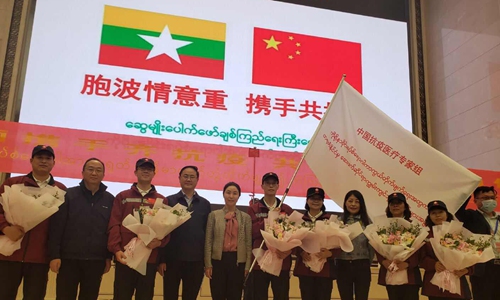We brought a whole set of laboratory test equipment to Myanmar: China medical team
By Li Sikun Source:Global Times Published: 2020/4/16 21:43:40

While Myanmar is actively promoting anti-pandemic work in the country, a gap still ex-ists between its detection capacity and actual needs, China's medical experts sent to aid Myanmar said on Wednesday, suggesting the country set up a testing laboratory in Mandalay to carry out testing as soon as possible and note that the country has no COVID-19 outbreak risk so far.
Detailed questions by Myanmar doctors
A 12-member expert team was sent by Southwest China's Yunnan Province's center for disease control and prevention, and a few hospitals on April 8 to share experiences and provide instructions on COVID-19 prevention and control work. The experts specialize in fields including respiratory, infection, critical care, nursing, testing, traditional Chinese medicine, and others.
After spending a week in Myanmar and visit-ing its two biggest cities Rangoon and Man-dalay, the team has acquired a basic under-standing of the pandemic prevention and control work in the country, Yang Lijuan, head of the expert group, told the Global Times on Wednesday.
The team members were divided into four groups after their arrival: epidemiological in-vestigation, laboratory testing, clinical treat-ment, nursing and infection control, and tradi-tional medicine. Each team communicated with local doctors and medical personnel to understand the progress of the work and pro-vided help, Yang said.
Specifically, Chinese experts conducted field visits to the main traffic routes, quarantine places and populated areas in Yangon and Mandalay for epidemiological investigation, and went to a few designated hospitals in Yangon to discuss with medical experts there about clinical treatment, nursing and infection control at the hospital, according to her.
"During our visits, the doctors were very ded-icated and asked us a lot of very detailed questions wherever we went," she said, not-ing that China's treatment plans for COVID-19 patients include more details compared to the WHO's guidelines that Myanmar used to treat its patients.
The team explained in detail the doctors' questions concerning patients in minor, se-vere and critical conditions respectively.
"In particular, how to adjust the fever clinics, how to deal with the patients under medical observation, are the kinds of problems that they often encounter during their daily work. They need our experience," Yang said.
Experiment and test equipment
Myanmar recorded no confirmed cases until March 23 when the first case was discovered. But some media has questioned the record claiming it is a result of poor test capability.
Yang did not agree on such a question, say-ing that she saw Myanmar try the best to pre-vent the pandemic. "Myanmar prolonged quarantine period from 14 days to 28 days on April 12. We can see that the country is mak-ing up for the deficiency in test capacity by prolonging quarantine period," she said.
However, test capacity is still playing an irre-placeable role in the anti-pandemic battle, providing data support for policymakers. The Global Times learned that, in Myanmar, only the National Health Laboratory is capable to conduct a test for coronavirus. The lab can test 200-300 samples in a single day each taking 16-17 hours.
Yang said that it is true that the lab's test ca-pacity could not meet the country's demand, especially considering that Mandalay, the biggest city in Northern Myanmar, has not conducted tests yet.
"I think Mandalay should build test labs as soon as possible to cover those in need in the North," Yang said.
According to media reports, the Chinese ex-pert team to Myanmar brought a total of 5.3 tons of materials and equipment with them including nucleic acid isolation machines, Polymerase Chain Reaction test machines and test kits. They also took 8,500 N95 masks, 60,000 disposable medical masks and 5,500 medical protective suits to Myan-mar.
Yunnan government attached heavy attention to the expert team's coming to Myanmar, do-nating a full set of equipment and materials for laboratory tests, which help the Myanmar side improve test capacity and speed, ac-cording to Yang.
Possibly no outbreak risk in Myanmar
Yang told the Global Times that Myanmar government has launched a series of measures to combat the COVID-19 pandem-ic, including issuing four versions of man-agement plans, locking down cities, banning human mobility and canceling clustering ac-tivities, including series celebrations for the Water-Sprinkling Festival, which proved to be effective.
As a while, Myanmar is actively prompting the anti-epidemic work, but they possibly could not conduct the measures as strict as China does when it comes to a specific detail or part. For example, China arranges one room for each person in quarantine centers but Myanmar possibly could not make it due to limited conditions.
Myanmar reported 74 COVID-19 cases with four cases as of Wednesday night after wit-nessing an apparent surge in recent days: the number of daily new cases in the country was 10 on April 11, 21 on April 13 and 12 on April 14.
Does the apparent jump indicate an outbreak in Myanmar? Yang said it is an unnecessary link and deemed the increase as a result of enhanced screening and test capacity.
"So far we see no sign of an outbreak," she said.
Posted in: SOCIETY